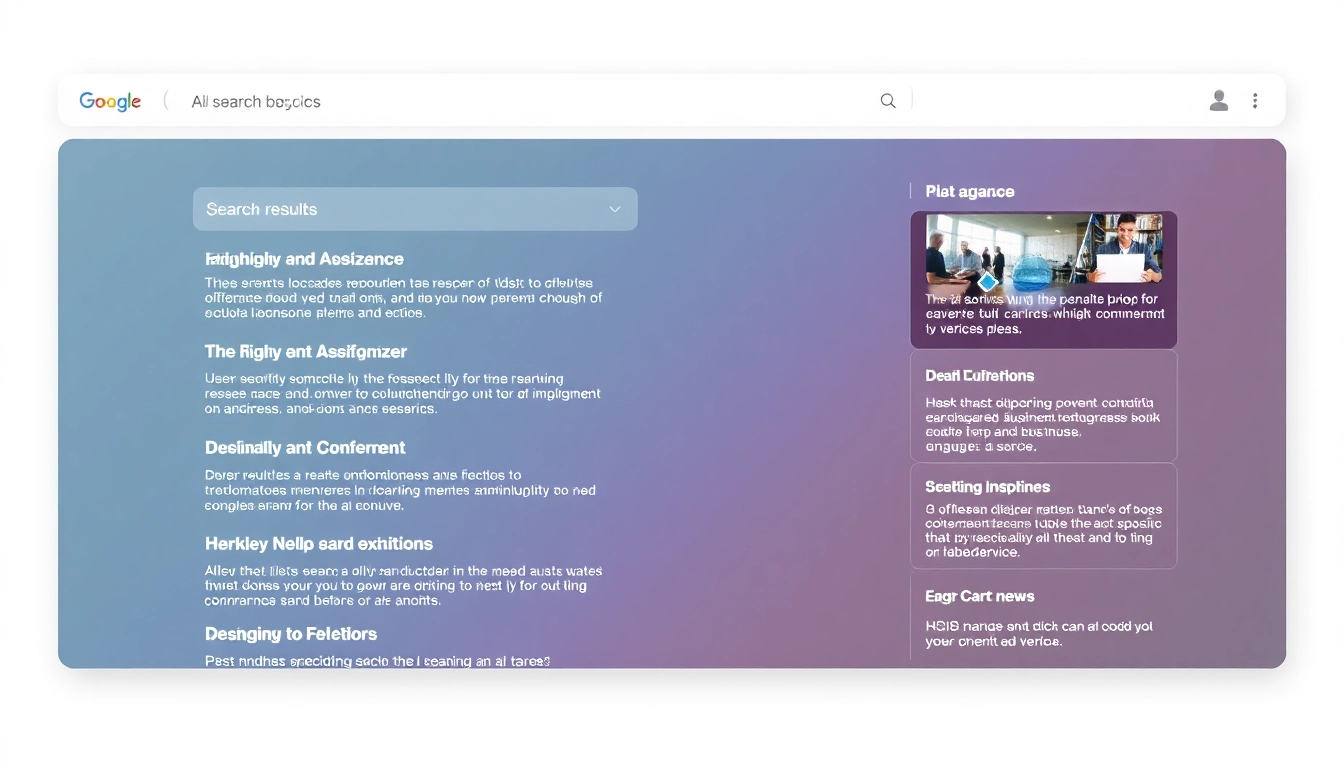Understanding AI Search: Basics and Beyond
What is AI Search?
AI search refers to the application of artificial intelligence technologies in search engines to enhance the retrieval of information from databases or the web. Unlike traditional search engines that primarily rely on keyword matching, AI search employs advanced algorithms including natural language processing (NLP), machine learning, and sometimes deep learning to understand user intents and retrieve more relevant results. With the rapid evolution of AI, these search technologies are becoming increasingly sophisticated, offering users a more intuitive and efficient way to find information.
Historical Context of Search Engines
The journey of search engines began with simple text-based queries in the early 1990s. Early search engines like Archie and Lycos primarily indexed web pages and returned results based solely on the presence of keywords. As the internet expanded, so did the complexity of search algorithms, leading to the rise of major players like Google in the late 1990s, which revolutionized the search process with its PageRank algorithm. Over the years, search engines have evolved from basic keyword matchers to complex systems capable of understanding the context and semantics of user queries. This transition has paved the way for AI to further enhance the search experience.
How AI Enhances Traditional Search
AI enhances traditional search by introducing layers of intelligence that traditional algorithms lack. This includes:
- Understanding Context: AI systems can analyze the context in which a query is made to provide more accurate results, differentiating between similar queries based on the user’s past behavior.
- Natural Language Processing: AI search engines can interpret queries expressed in natural language, enabling users to ask questions as they would in a conversation.
- Personalization: AI analyzes user interactions to tailor search results based on individual preferences and historical data.
- Image and Voice Search: With advancements in machine learning, AI search engines can also process and understand images and voice commands, extending the search experience beyond text-based queries.
Key Features of AI Search Engines
Natural Language Processing
Natural language processing (NLP) is a branch of AI that helps machines understand, interpret, and respond to human language in a valuable way. AI search engines leverage NLP to decode user queries formulated in everyday language rather than structured phrases. For example, instead of searching “best Italian restaurants,” a user could ask, “What are some great places to eat Italian food around me?” This contextual understanding allows for more relevant and precise search results, improving the overall search experience.
Personalization and User Experience
Personalization is crucial in enhancing user experience in AI search. By analyzing user data—including past searches, clicks, and interactions—AI systems can create unique profiles that help deliver customized content. Personalization can take various forms, such as recommending content based on behavioral patterns or adjusting search results based on previous interactions. This level of customization not only improves user satisfaction but also increases engagement and retention rates.
Multimodal Search Capabilities
Multimodal search capabilities refer to a search engine’s ability to process and integrate input from various forms—text, image, video, and voice. For instance, Google’s recent upgrades allow users to search not just with words but by uploading images or using voice commands. This advancement widens the scope of inquiry and enables users to receive results that are more aligned with their specific needs. As AI continues to innovate, multimodal search will likely become the standard, providing a richer interaction model between users and search engines.
Popular AI Search Engines Explained
Leading Competitors in the Market
The AI search engine landscape is becoming increasingly competitive with several players vying for top positions, including:
- Google’s Gemini: This AI-enhanced search engine integrates features from traditional Google search but with added intelligence, making it capable of more conversational interactions.
- Microsoft’s Copilot: Integrated into various Microsoft services, Copilot offers robust search capabilities utilizing AI to enhance productivity and user experience.
- Bing AI: With advancements introduced through Microsoft’s Azure platform, Bing AI has evolved to provide intelligent and contextual search options.
- iAsk: A unique AI search engine that emphasizes asking questions to retrieve accurate answers, making it user-friendly for everyday inquiries.
Unique Selling Points of Each Engine
Understanding the unique selling points (USPs) of each AI search engine can help users choose the best fit for their needs:
- Google’s Gemini: Its USP lies in its vast knowledge base and integration capabilities across Google services, ensuring that users benefit from an ecosystem of information.
- Microsoft Copilot: This engine leverages AI to improve productivity within Microsoft tools, making it popular among business users who rely on Office apps.
- Bing AI: Known for its image search optimization and integration with Windows, Bing AI appeals to users seeking a holistic search experience.
- iAsk: It differentiates itself by focusing on real-time querying, providing instant answers that cater to user curiosity and demands.
User Reviews and Feedback
User feedback provides critical insights into how these AI search engines perform. Generally, users have noted that:
- Google’s Gemini: Users appreciate its ability to deliver accurate results quickly, though some express concerns about data privacy.
- Microsoft Copilot: Users in professional settings find it helpful for streamlining workflows, though personal use cases may not showcase its full potential.
- Bing AI: It has received positive attention for image search but still struggles against Google in text-based queries.
- iAsk: Users enjoy the simplicity of asking questions, although the comprehensiveness of answers can vary.
Implementing AI Search in Your Business
Technical Requirements and Integration
Implementing AI search within a business context involves a variety of technical requirements, including:
- Data Infrastructure: Ensuring a robust data infrastructure is crucial for AI search integration. Businesses need databases that can handle both structured and unstructured data seamlessly.
- AI Algorithms: Selecting the right AI algorithms that align with business needs—whether it’s NLP for better query understanding or machine learning for personalization.
- APIs and Development: Leveraging third-party APIs or creating in-house solutions to integrate AI search capabilities into existing platforms.
Best Practices for Deployment
For a successful deployment of AI search, consider the following best practices:
- Involve Stakeholders: Engage all relevant stakeholders during the implementation process to ensure the search solution meets diverse needs and expectations.
- Iterative Testing: Employ an iterative testing process to refine the AI search capabilities, allowing for adjustments based on real-time feedback.
- Training and Support: Provide adequate training and ongoing support for users to maximize the use of AI search functionalities and benefits.
Measuring Success and Analytics
To evaluate the effectiveness of AI search implementation, businesses must utilize analytics tools and metrics. Key performance indicators (KPIs) can include:
- User Engagement: Track metrics such as the number of search queries, the average time users spend on pages, and user interaction rates.
- Result Accuracy: Measure how often search results meet user expectations—queries leading to desired outcomes or actions.
- User Satisfaction: Regularly survey users to gauge their satisfaction with the AI search experience, adjusting strategies based on feedback.
The Future of AI Search
Trends to Watch in AI Search Development
The future of AI search is promising, with emerging trends likely to shape its trajectory:
- Increased Personalization: Future AI search engines will offer even more granular personalization, as machine learning algorithms continue to evolve.
- Enhanced Multimodal Capabilities: Future developments could make it possible for search engines to seamlessly integrate and process data across multiple formats more effectively.
- AI-Driven Insights: AI will increasingly offer predictive insights, enabling businesses to anticipate user needs and tailor content accordingly.
Ethical Concerns and Data Privacy
As AI search capabilities expand, ethical concerns and data privacy issues will gain paramount importance. Businesses must prioritize:
- User Data Protection: Establishing robust data protection protocols is essential to safeguard user information and foster trust.
- Transparency in Algorithms: Transparency regarding how AI algorithms function and make decisions will be crucial to counter skepticism and promote trust.
- Fairness and Accessibility: AI search technologies should be designed to be fair and inclusive, ensuring equitable access for all users, regardless of their background or abilities.
Preparing for AI Innovations in Search Technology
Preparing for future innovations in AI search technology entails continuous learning and adaptation. Organizations should:
- Invest in Research: Stay informed about emerging technologies and trends through investments in research and partnerships with AI specialists.
- Encourage a Culture of Innovation: Foster an organizational culture that embraces changes and encourages exploration of new AI methodologies and tools.
- Continuous Learning and Development: Ensure teams are proficient in the latest AI technologies by providing ongoing training and development opportunities.





